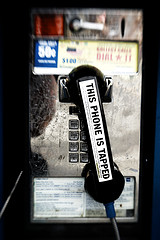 Justice Albin continued in relevant part: The telephone is an essential instrument in carrying on personal affairs, and there is a general societal assumption that the people and places one calls on a telephone, no less than the resulting conversations, will be private. The place where such a call is made does not matter, be it home, office, hotel, or even public phone booth. What a person seeks to preserve as private, even in an area open to the public, may be constitutionally protected, and a person does not lose the right to the privacy of a telephone call simply because he made his calls from a place where he might be seen.
Justice Albin continued in relevant part: The telephone is an essential instrument in carrying on personal affairs, and there is a general societal assumption that the people and places one calls on a telephone, no less than the resulting conversations, will be private. The place where such a call is made does not matter, be it home, office, hotel, or even public phone booth. What a person seeks to preserve as private, even in an area open to the public, may be constitutionally protected, and a person does not lose the right to the privacy of a telephone call simply because he made his calls from a place where he might be seen.
A police station’s “report writing room” is not an area open to the public, and legitimate security concerns must be taken into account in the setting of a stationhouse. Few would dispute that an arrestee has a lesser expectation of privacy within the confines of a police station. A police station, however, is not a constitution-free zone. Clearly, an arrestee cannot make a call from a stationhouse phone line without the authorization of the police. When permission is given, however, the State does not suggest that the police have a right to record and listen to an arrestee’s stationhouse call to his attorney. And, of course, the phone lines are not used exclusively by arrestees. No empirical evidence has been presented to support that there is a general understanding that all outgoing phone lines from a police station are recorded or that social norms instruct that an expectation of privacy in a police station call is not one that “society is prepared to recognize as reasonable.” See State v. Evers, 175 N.J. 355, 369 (2003).
The Court’s reference to a “public phone booth” is dated. It is difficult to find any public phones aside from non-functioning ones that for some reason were never removed from their locations. The reference likely comes from a reference to precedent from decades ago.
